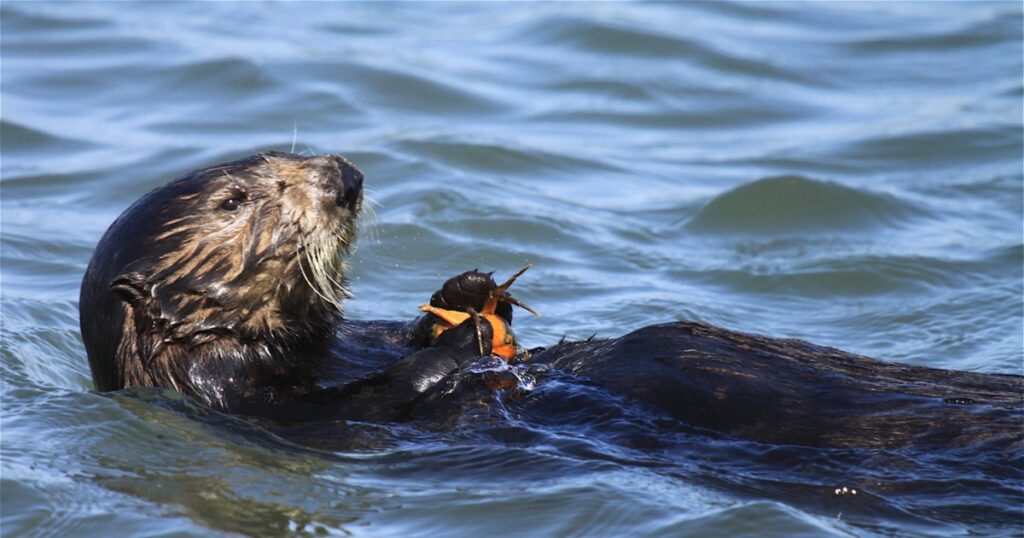
1. Southern Sea Otters Keep Endangered Species Act Protections
The U.S. Fish and Wildlife Service announced that southern sea otters will keep their status as an endangered species, thereby rejecting a bid by California fishing organizations to remove the oceangoing mammal from the Endangered Species Act list it has inhabited since 1977.
“While southern sea otters have made strides toward recovery after coming back from the brink of extinction in our recent history, they continue to face significant threats from climate change, shark-bite mortality, and limited range,” said Steve Henry, field supervisor for the U.S. Fish and Wildlife Service in Ventura.
“Based on scientific projections of future conditions for the species, these threats will continue to impact southern sea otter abundance and connectivity between populations in ways that will most likely reduce the ability of the species to sustain itself in the future.”
Thank you for your generous gift that will help us continue the production of this weekly, free publication
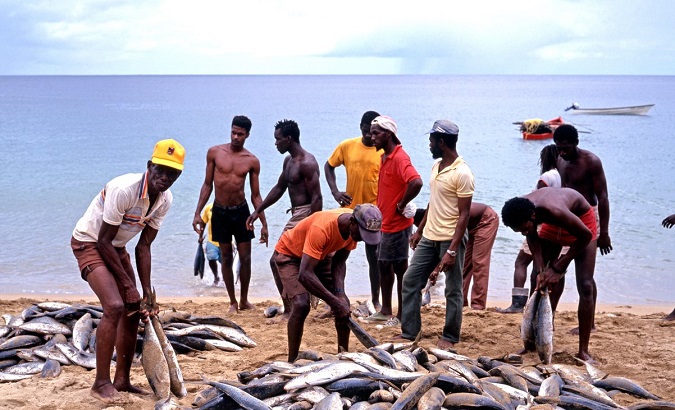
2. EU Bans Fish Imports from Trinidad and Tobago for Fishing Violations
Illegal, unreported, or unregulated (IUU) fishing is one of the most serious threats to the sustainable exploitation of living aquatic resources. Fighting IUU fishing is part of the EU’s actions under the 2030 Agenda for Sustainable Development of the United Nations. Because the EU is the world’s largest import market for fisheries products, the European Commission (EC) is responsible for ensuring that products stemming from IUU fishing activities do not access the EU single market.
The EC identified Trinidad and Tobago as a non-cooperating third country in the fight against IUU fishing based on its history of serious shortcomings in managing fishing vessels, allowing fish inspections, and adhering to conservation measures identified since 2016. Until Trinidad and Tobago address the identified shortcomings, importation of its fishery products will be refused.
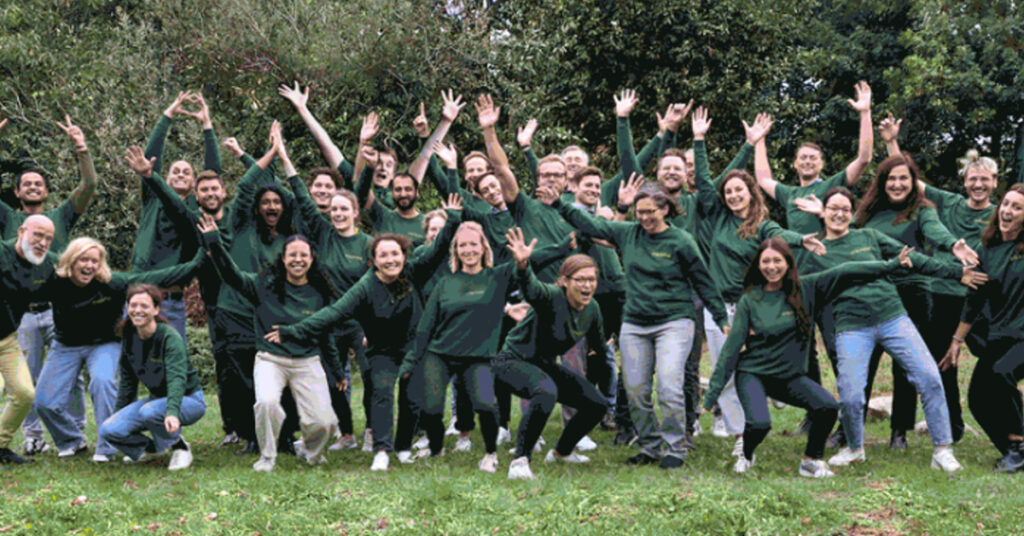
3. Germany’s Traceless Materials Bags €36.6M to Replace Thousands of Tons of Conventional Plastics: Here’s How
Traceless Materials will use the funds to expand production capabilities of its innovative biomaterial technology to an industrial scale. Plastic pollution is a problem as it not only leaves visible traces but also significantly contributes to the climate crisis due to its resource-intensive production from fossil fuels. Traceless Materials developed a bio-based, home-compostable, and plastic-free biomaterial called traceless to address this issue sustainably.
Olivier Raybaud, Managing Director of SWEN Capital Partners says, “As plastic pollution is one of the main pollutants threatening our ocean, we were seduced by traceless, a bio-based and biodegradable material that can replace plastics in products that easily end up in the environment, and hence in our ocean, such as single-use packaging as well as hidden plastics in adhesives and paper coatings. traceless is a compelling alternative to applications where reusable solutions are not sustainable and technical recycling is not feasible”.
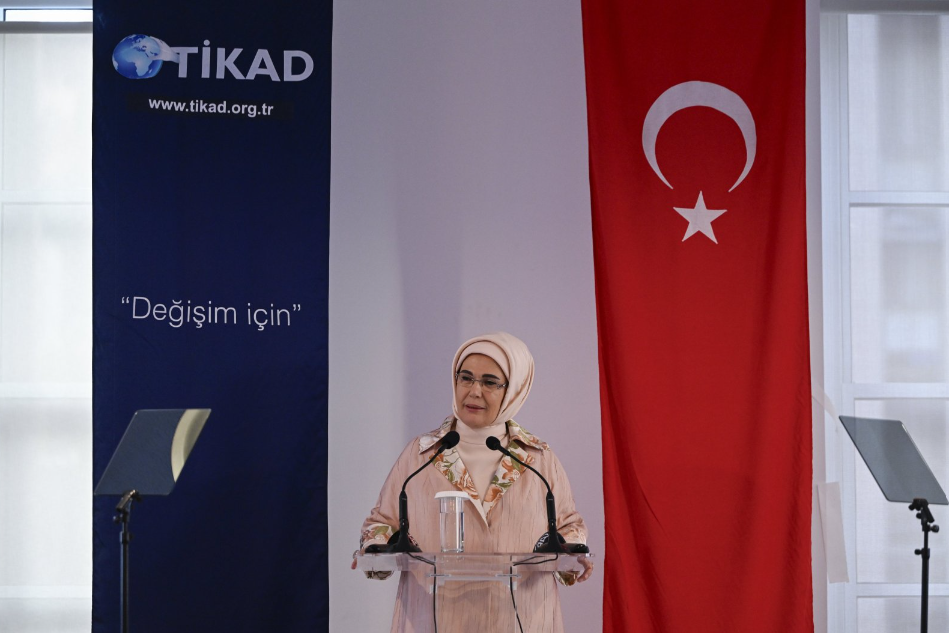
4. Global Leaders Applaud Turkish First Lady’s ‘Zero Waste’ Initiative
Distinguished delegates from around the world gathered at the 78th United Nations General Assembly to underscore the paramount significance of the “Zero Waste” project, offering their gratitude to First Lady Emine Erdoğan for her steadfast leadership in advancing this global initiative. The high-profile event, titled “Toward a Global Zero Waste Movement,” drew the participation of prominent figures, including the spouses of heads of state, senior U.N. officials, and international diplomats, making it a focal point of the assembly.
During her address, Sharif underscored the upcoming World Cities Day, scheduled for Oct. 31 in Istanbul, with the central theme of “Financing a Sustainable Urban Future for All.” She stressed the imperative for the “Zero Waste” movement to be all-encompassing and equitable. Sharif asserted that the global zero waste movement was necessary, driven by the acknowledgment of limited global resources and the fragility of our ecosystems.
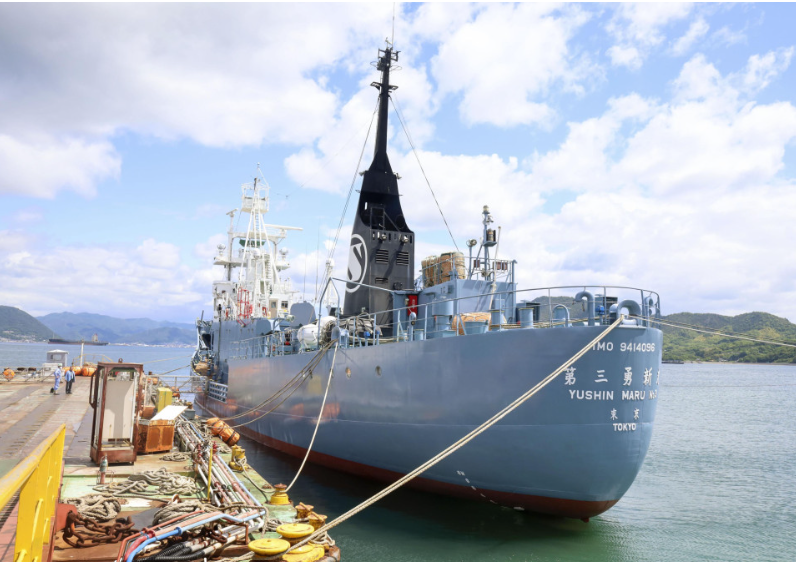
5. U.S. Drops Anti-Whaling Wording Opposed by Japan in Indo-Pacific Pact
The U.S. has abandoned efforts to include anti-whaling language in its Indo-Pacific trade pact following fierce opposition from Japan. The resolution, a main point of contention between two key members of the Indo-Pacific Economic Framework, has paved the way for an agreement during a November summit in San Francisco.
After withdrawing from the International Whaling Commission in 2019, Japan resumed commercial whaling in its waters. Including anti-whaling language in the trade pact would have made it difficult for this practice. Originally addressed under “fair trade,” Japan strongly opposed its explicit mention. The U.S. abandoned its efforts this summer to avoid jeopardizing negotiations.
The IPEF represents about 40% of global gross domestic product. The U.S. – Mexico – Canada Agreement explicitly prohibits “the killing of great whales for commercial purposes.”.

6. Xampla launches consumer brand to compete with plastic packaging
Material manufacturer Xampla launched its first consumer brand – Morro. The “Morro marque” will indicate where high-performing, sustainable, plant-based materials are used to make products in a way that is good for the planet. The announcement comes as a survey of 2,000 UK adults showed that 54% see plastic as a “material of the past”. Some 76% of respondents prefer their products ‘to come in natural, plastic-free packaging that can be composted at home or taken by the council alongside food waste’.
The technology is completely plastic-free, and the material is not chemically modified, which Xampla says ensures it is able to break down with food waste and even in the sea or soil if it accidentally ends up there.“Morro will enable brands to make an easy switch away from single-use plastics, and our breakthrough material can do things plastic never could.”
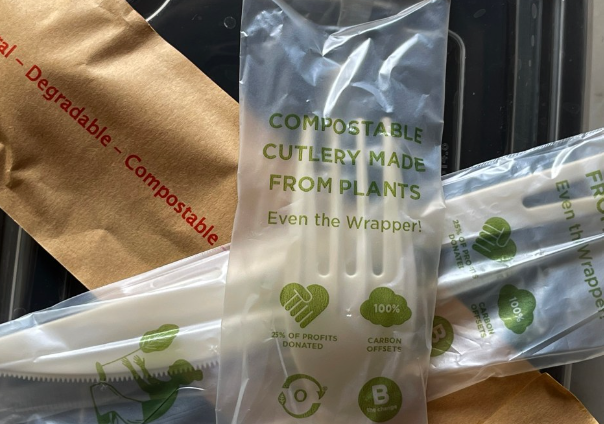
7. Corte Madera, California Approves Reusable Foodware Ordinance
The Corte Madera Town Council has adopted a reusable food ware ordinance that has been tailored to address the concerns of local officials and businesses. The ordinance includes items such as forks, spoons, knives, chopsticks, napkins, cup sleeves, food wrappers, beverage trays, condiment containers, toothpicks, and straws. It mandates that these accessories be made available only upon request or at a self-serve takeout station.
Businesses can provide plastic straws on request, but only to accommodate people with “access needs.” The town’s ordinance redefines dine-in restaurants as eateries with seating for 15 or more people, giving more flexibility to smaller establishments where take-out customers are the majority. The ordinance also applies to caterers serving food at events that require town permits. The town will serve as the enforcement agency. Because the rules are different than the county ordinance, county officials declined to provide enforcement.
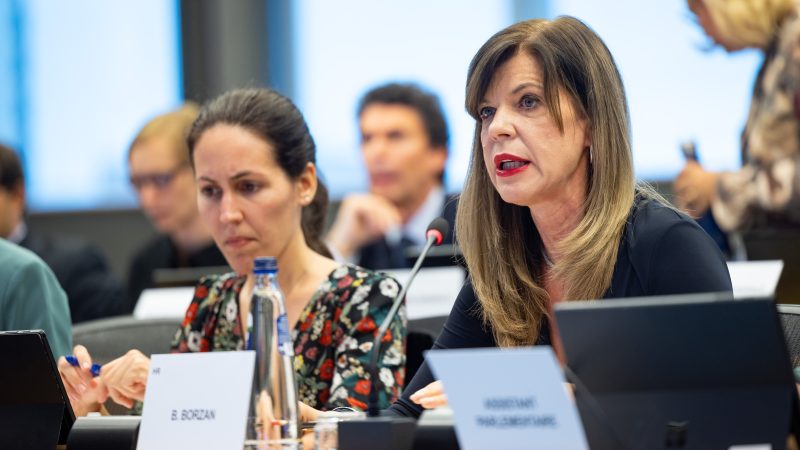
8. EU Reaches Deal Banning ‘Climate-Neutral’ Product Claims
In the wake of longstanding complaints of greenwashing by consumer advocates, EU institutions finalized a new law enacting a ban to combat the misleading of its citizens through erroneous claims of sustainability. In March 2022, the European Commission proposed a law to empower consumers, which, following the conclusion of negotiations between EU countries and Parliament, will now ban companies from claiming that their products are climate-neutral.
The law still requires final approval by EU countries and the parliament’s plenary assembly – a formality – will be felt from 2026, as EU countries will be given two years to adopt the changes. Greenwashing, the practice of making misleading claims as to a product’s climate friendliness, is expected to cease rather quickly. In practice, the changes will mean that companies are effectively prohibited from making such claims altogether.
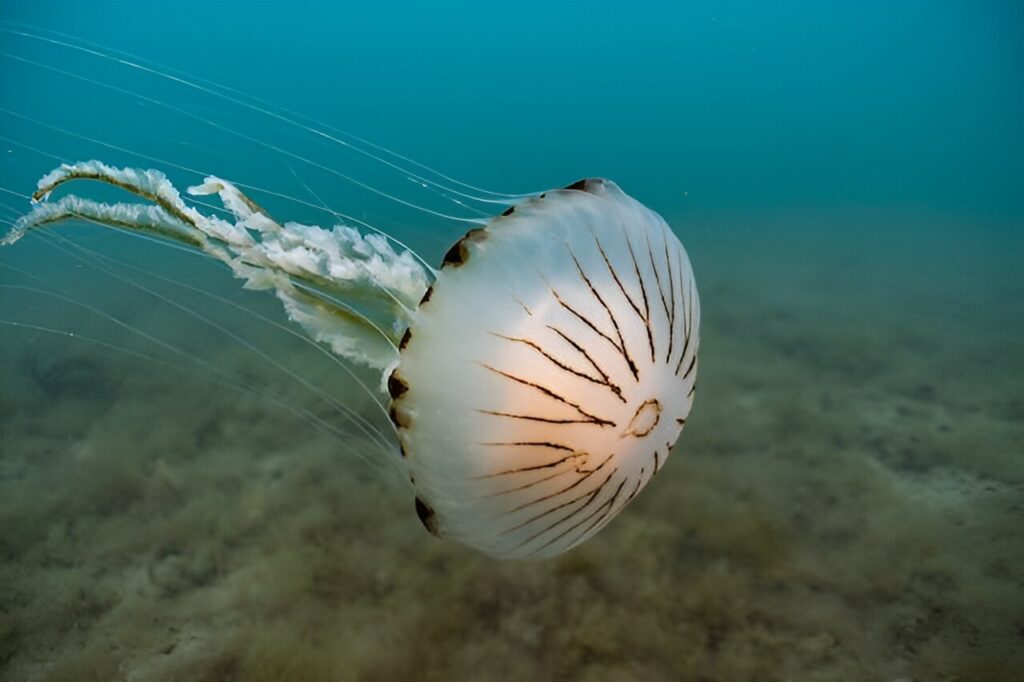
9. Five Jellyfish Species You May Encounter More Often in UK’s Warming Seas
While scuba diving off the southwest coast of England this summer, I was lucky to encounter several different species of jellyfish in just a matter of weeks. Many of these, including the compass jellyfish (Chrysaora hysoscella), are already common in UK waters. But among them was one that I had never laid eyes on before – the crystal jelly (Aequorea victoria) – a creature capable of glowing in the dark.
The good news for fellow jellyfish enthusiasts is that both the abundance and diversity of jellyfish around the UK may be on the rise. Warmer sea temperatures mean that jellyfish can now inhabit a wider range of habitats, with some species moving polewards into waters that were once too cold for them. The five jellyfish in the article. Compass jellyfish, Moon jellyfish, Barrel jellyfish, Lion’s mane jellyfish, and the Mauve stinger!

10. New Pennsylvania Shell Plant Brings Pollution and Plastic. We’re Fighting Back
There’s a beast on the banks of the Ohio River in Beaver County, Pennsylvania. It spews fire, smoke, and steam, emits foul smells, and sends toxic air pollutants into the skies. This beast is Shell Polymers Monaca, a plastic-producing ethane cracker plant. Shell promised it would bring new jobs and new business, but since opening in the fall of 2022, the plant has delivered as we expected: malfunctions galore, permit violations, and harrowing pollution for nearby residents.
Plants like these are linchpins in our linked plastic and climate crises. They drive more drilling and fracking to supply ethane. One researcher estimates that a plant the size of Shell’s would need 1,000 wells to supply it. The plant itself is expected to have the same annual greenhouse gas emissions as 430,000 extra cars on the road.
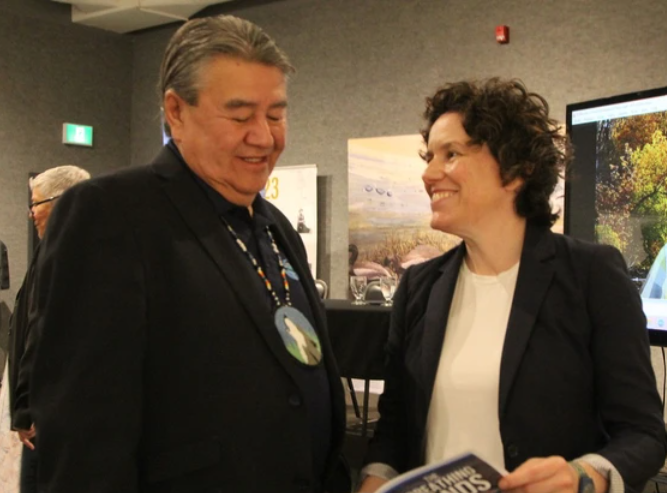
11. Canadian Province Urged to Shift Focus on Future Mining Away From Ring of Fire
The Ontario government is being called upon by an Indigenous-led conservation effort to support existing mining projects rather than opening new ground within the Ring of Fire. “There are at least six different large nickel projects in the Timmins and Sudbury area,” said Anna Baggio, director of conservation planning with the Wildlands League, which has teamed up with Mushkegowuk Council in support of establishing a National Marine Conservation Area along the James and Hudson Bay coast.
She said it makes more economic sense to extract where there are roads, railways, and mining infrastructure already in place. She cited the Crawford Project, being developed 43 kilometres north of Timmins by Canada Nickel, as one of the preferred sites. Besides, Baggio added, those projects could be in production much sooner than anything being proposed within the Ring of Fire.
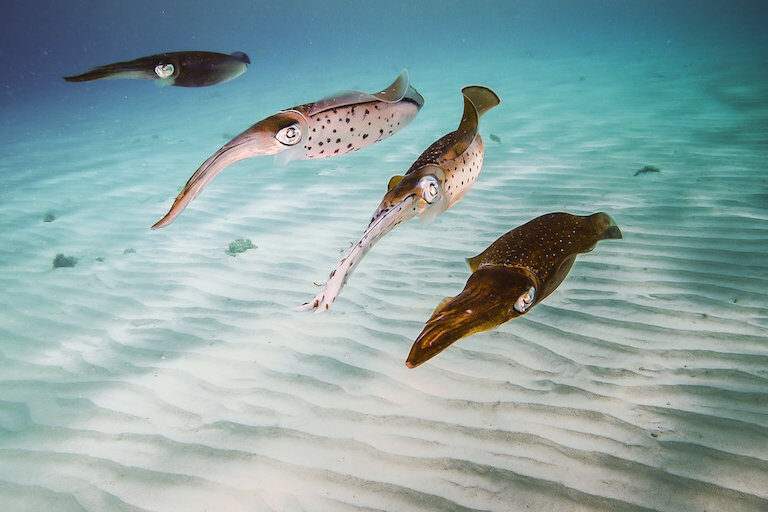
12. For the Oceans, Global Community Must Fund Sustainable Development Goal 14
Historically, “Life Below the Water” is the least-funded goal of all. Prioritizing new investment in this goal directly invests in small-scale fisheries, critical blue foods, and coastal and supply chain livelihoods. Notably, many of the communities that would benefit are also those hit hardest by climate change. What would new investment in the ocean buy? The ocean provides a variety of climate change-related benefits, including carbon absorption and sequestration.
It absorbs around a quarter of the world’s annual CO2 emissions. Ocean carbon capture and storage occurs through biological processes in coastal areas and open ocean environments alike. Salt marshes, seagrasses, and mangroves’ roles are fairly well known. Less well-known are the roles of the open ocean ecosystem in capturing and sequestering carbon and the extensive carbon stores in marine sediments. Sustainable fisheries, protected areas and a variety of other ocean-based solutions deserve more attention.
Editorial Comment: Please note that this is a commentary
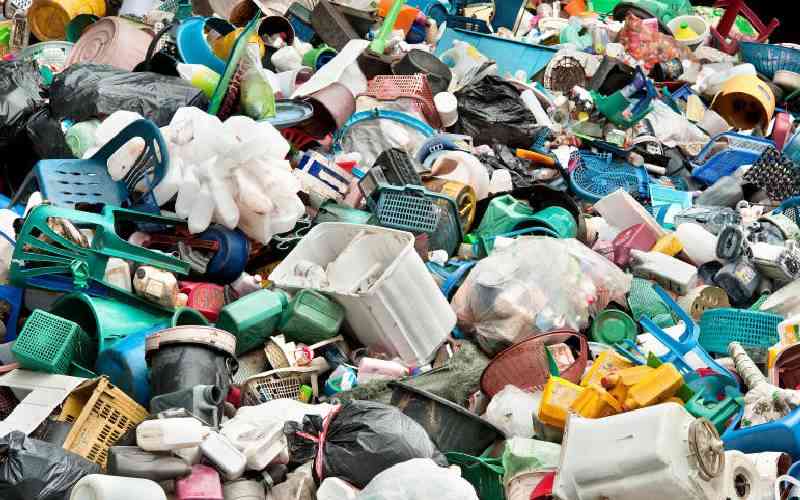
13. Kenya Can Reap Green Dividends From Plastic Waste Management
Kenya is amongst the first countries in East Africa to limit single-use plastics and sign the Clean Seas initiative. In 2017, Kenya made the bold decision to ban single-use plastic bags, becoming one of the first African countries to commit to limiting plastic in its waterways. As of June 2020, visitors to Kenya’s national parks, beaches, forests, and conservation areas are no longer allowed plastic water bottles, cups, disposable plates, cutlery, or straws into protected areas.
The government’s commitment to steer the country towards a circular economy is seen through its collaboration with private sector players. While the government’s key role should be to create policy frameworks and enforce them, the private sector and society at large have a duty to adopt the principles of a circular economy including elimination of waste and pollution, circulation of materials and products, and regeneration of natural systems.
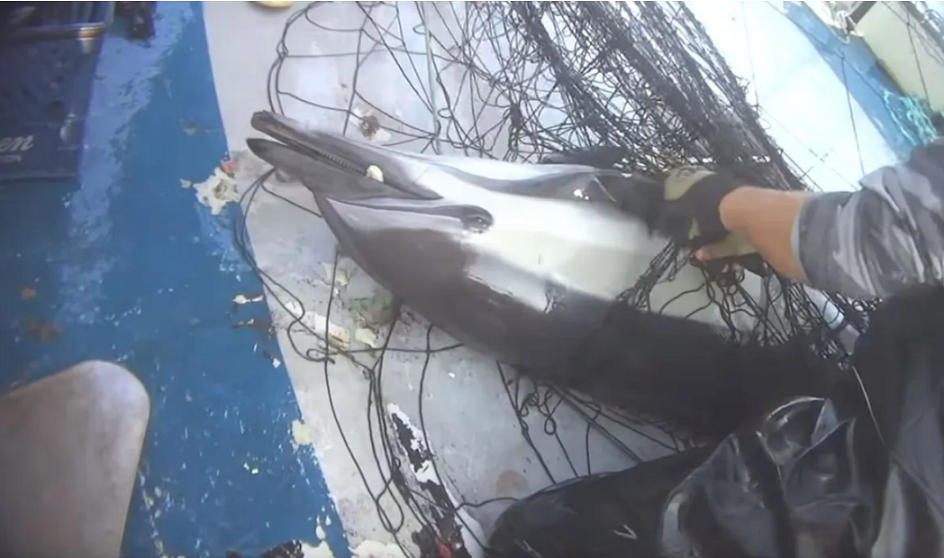
14. First Permits Issued for New Swordfish Fishing Gear That’s Safe for Marine Mammals
The National Marine Fisheries Service recently issued its first 50 permits to fishermen using a new deep-set buoy gear that, unlike the mile-long, 100-foot-wide nets that drift in the ocean to tangle up fish, uses hooks to target only swordfish. The permits are going to the drift net fishermen who first agreed to pioneer the new gear and to fishermen who took buyouts to ditch the mesh nets permanently.
The plan is to develop a new fishery using the gear and issue 25 new permits each year until 2027. Geoff Shester, a senior scientist with the nonprofit advocacy group Oceana, is among those who have been pushing for the new gear for years and called the new permits “a banner day for whales, dolphins, and sea turtles that swim off our shores,” while also being “a massive leap forward for sustainable swordfish fishing in California.”
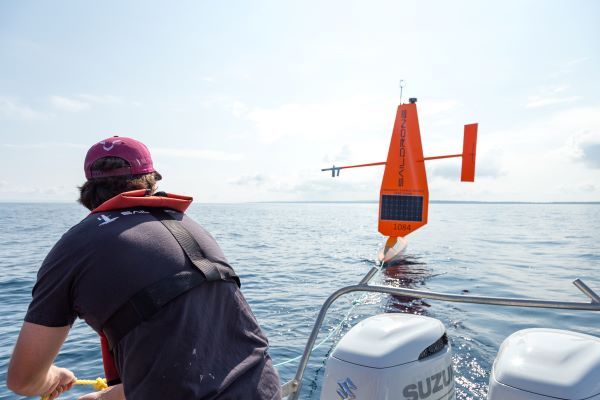
15. Current US Administration Invests $3.9 Million for Ocean Enterprise Engagement Through Investing in America Agenda
The Department of Commerce and NOAA announced $3.9 million to the Marine Technology Society to establish a multi-year framework engaging the Ocean Enterprise as part of the Investing in America agenda. The Ocean Enterprise includes public, private, non-profit, tribal, and academic entities that provide ocean observation, measurement, and forecasting data or deliver operational ocean information products and services. “Ocean data and information powers America’s robust marine economy,” said U.S. Secretary of Commerce Gina Raimondo.
This investment will help accelerate growth and advance partnership opportunities within the ocean information sector as it works to develop solutions to pressing climate and resilience challenges.” Funded by the Inflation Reduction Act — the largest climate investment in history — this project will support NOAA in defining Ocean Enterprise requirements and identifying new market opportunities to advance public-private partnerships in support of coastal and ocean climate resilience and workforce development.
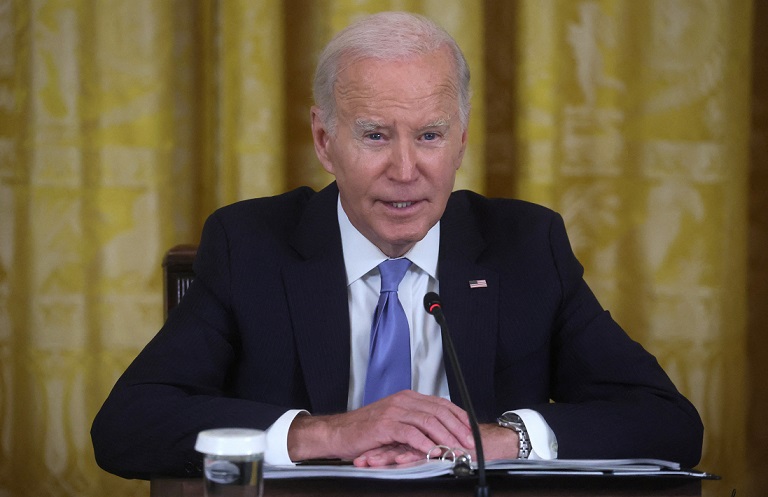
16. US Acknowledges Independence of Cook Islands and Niue
In a significant diplomatic move, President Biden has announced the US recognition of the independence of two small Pacific nations, the Cook Islands and Niue. This decision underscores the commitment of the United States to support the sovereignty and autonomy of nations across the world. The recognition of these Pacific nations is a crucial step in bolstering their international standing, allowing them to engage more fully in global affairs and negotiations.
It opens up avenues for diplomatic relations, international trade, and aid, fostering economic growth and stability in the region. The move is also seen as part of the US strategy to strengthen its presence and partnerships in the Pacific, a region of growing geopolitical importance. The announcement has been welcomed by various international actors, highlighting its positive implications for global cooperation and peace.

17. Malta Enterprise Launches the Blue Med, a Focal Point for Sustainable Blue Economy
The Ministry for the Environment, Energy, and Enterprise – through Malta Enterprise – has launched the ‘Blue Med Focal Point’ initiative. It assists enterprises and businesses in developing projects and ideas contributing to a sustainable blue economy in Malta and Gozo. As part of this initiative, Malta Enterprise has also announced the ‘SDG 14 Challenge’, with an allocation of €4 million to attract companies with innovative solutions in this field.
This is an international competition addressing the sustainable development goal 14 (SDG14) – “Life Below Water”. The Blue Med targets local and international businesses in emerging blue economic niches with the goal of making their operations more sustainable. More information on the Blue Med and the SDG 14 international challenge is available on maltaenterprise.com. Applications for the SDG 14 Challenge are now open until January 12, 2024.

18. Plastic Pollution: Lagos Recyclers Seek Protection of Marine Ecosystem
The Lagos Recyclers Association (LAGRA) has called upon individuals, governments, and corporate bodies to take responsibility for reducing waste and plastic pollution and safeguarding the health and sustainability of marine ecosystems. Dr. Femi Idowu-Adegoke, the association’s President, made the call during the 2nd Annual Lagos Recyclers Conference and Exhibition, themed ‘Life Under Water.’ He emphasized the imperative of achieving Sustainable Development Goal 14 (SDG 14), to conserve and sustainably use oceans, seas, and marine resources for development.
Idowu-Adegoke called for innovative solutions to manage the 86% of plastic that isn’t recyclable. The conference shed light on the escalating threats of climate change and plastic pollution, advocating for clean energy adoption, responsible seafood consumption, and effective waste management to protect marine ecosystems. Officials emphasized the importance of public awareness campaigns and responsible waste disposal, stressing the collective role in environmental sustainability.
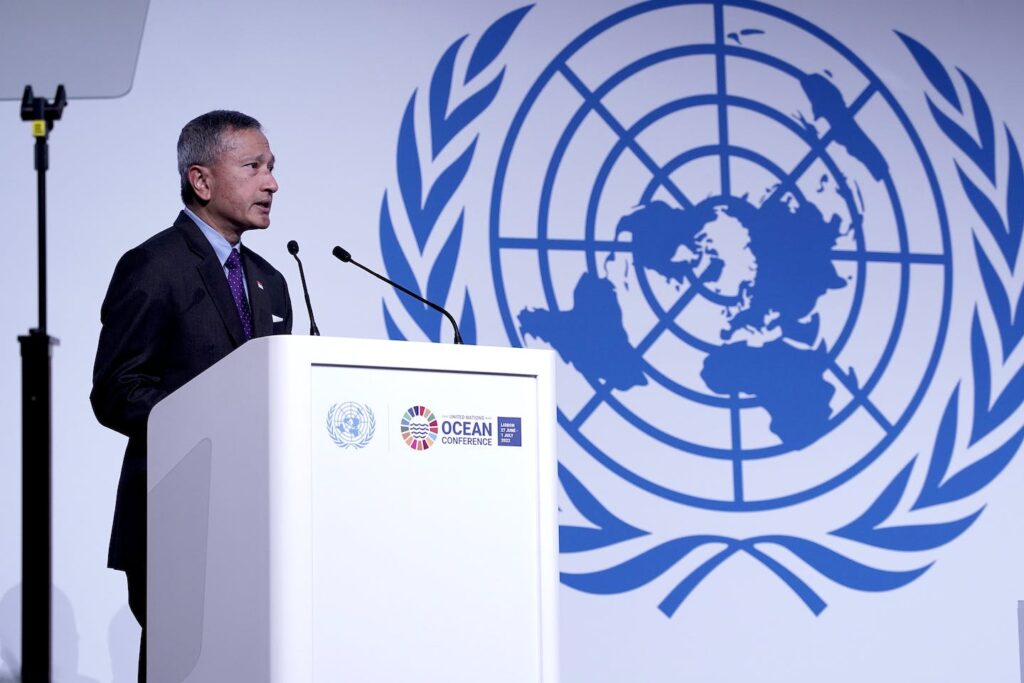
19. Green Shipping Must Be Economically Sustainable Too: Singapore Foreign Minister Vivian Balakrishnan
Singapore is doing its bit for ocean conservation and sees such efforts as critical to being able to continue making its living by the sea. At the Earthshot Prize Innovation Summit, coinciding with the United Nations General Assembly in New York, Foreign Minister Vivian Balakrishnan stated that preserving oceans and maintaining livelihoods are not mutually exclusive. The Earthshot Prize, founded by Britain’s Prince William, will reward $1.7 million to five individuals or organizations that come up with innovative solutions to environmental problems.
Balakrishnan stressed that decarbonization and digitalization of the maritime sector are critical to conservation efforts. He mentioned a recent international treaty, the Biodiversity Beyond National Jurisdiction Treaty, as a significant step in protecting the high seas. Singapore also believes in sharing its expertise, particularly with The Small Island Developing States, which are heavily reliant on oceans.
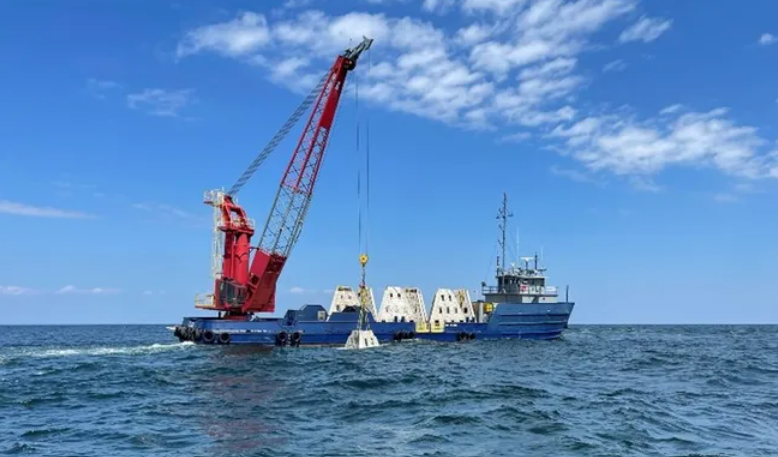
20. Major Additions to Big Bend Gulf Artificial Reefs Deployed in Franklin County
Over 220 tons of new marine habitat were deployed Sept. 19 in the coastal Gulf waters off Lanark Village in Franklin County, Florida. Dedicated, environmentally friendly reef modules were sunk in three locations. They included 10 “Super Reef” pyramids (15ft tall, 17 tons each) and 18 “Florida Special” pyramids (8ft tall, 3 tons each). These artificial reefs mimic natural habitats, benefiting a range of marine life.
The project cost $200,000, funded by the Florida Fish and Wildlife Conservation Commission and the Organization for Artificial Reefs. Memorial structures were dedicated to fallen heroes and funded through donations. The efforts were a collaboration between various organizations and individuals. The Organization for Artificial Reefs is committed to enhancing marine habitats for both marine life and the local economy. Visit oarreefs.org for more information.
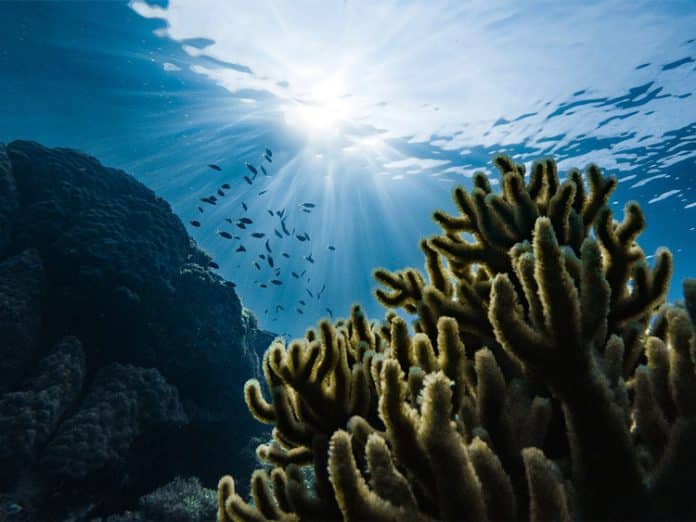
21. Global Warming: 90% of Emissions Heat Absorbed by the Ocean
Global average sea surface temperatures play a crucial role in shaping climate patterns and marine ecosystems and have now reached record highs. Recently, the World Meteorological Organization (WMO) released an assessment of sea surface temperatures and their implications for the planet. UNRIC spoke with Regina Rodrigues, a professor of Physical Oceanography at the Federal University of Santa Catarina, delving into the causes of recent widespread marine heatwaves.
These events are primarily driven by atmospheric conditions. Climate changes caused by emissions are increasing the duration of heatwaves. 90% of emitted heat trapped by emissions is absorbed by the ocean. Stopping emissions is imperative, but even then, the observed heat in the ocean will persist for a long time. An equilibrium will gradually be established, however, the urgency to act is evident or the situation will only get more complex.
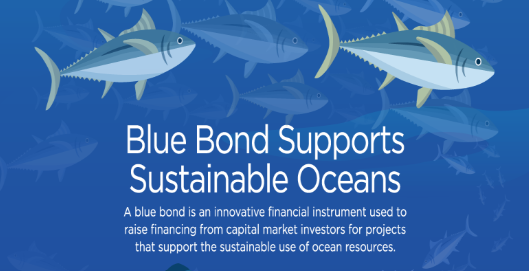
22. Blue Bond Guidance Issued by U.S. Securities Regulator
The Securities and Exchange Commission (SEC) said initiatives that aim to nurture a sustainable marine ecosystem may now be funded by “blue bonds.” These projects are those that fall under ecosystem management and natural resources restoration of water-based ecosystems; sustainable fisheries management; sustainable aquaculture; and sustainable tourism in the vicinity of marine conservation areas.
In its memorandum, the SEC said that a blue bond must “substantially contribute to objective numbers 6 and/or 14 of the United Nations Sustainable Development Goals, which seeks to ensure availability and sustainable management of water and sanitation for all, and conserve and sustainably use the oceans, seas and marine resources for sustainable development, respectively.”
A subset of the similarly-ecologically responsive green bonds, blue bonds are debt instruments issued to raise capital to finance marine and ocean-based projects that have positive environmental, economic, and climate benefits, termed “blue projects.”
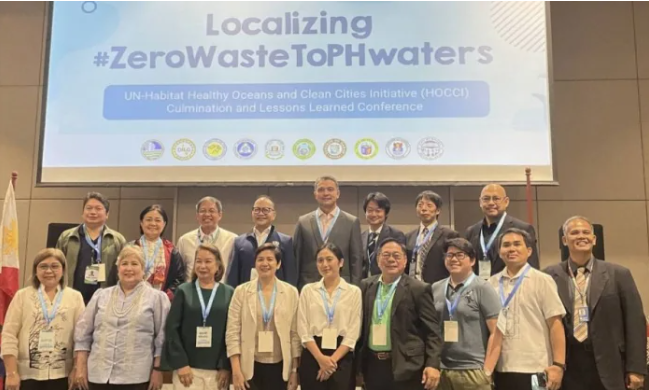
23. Japan Supports Philippines’ Efforts to Reduce Marine Litter
The Healthy Oceans and Clean Cities Initiative (HOCCI) held September 15 highlighted the achievements and lessons learned by the partner cities and communities in their plans to reduce marine litter. A regional initiative by UN-Habitat in the Philippines and the government of Japan, HOCCI addresses the growing concern over marine plastic pollution that endangers the environment, marine ecosystems, and public health.
While the Philippines has among the highest trash collection rates in Southeast Asia, it remains the world’s third-largest source of marine litter. With UN-Habitat Philippines’ lead, the Government of Japan funded $3 million for this project. It primarily provided support for improved governance structures and capacities for the localization of the National Plan of Action for Marine Litter and the vertical integration of the marine plastic litter response. The project also assisted the cities in improving technology and systems for marine plastic litter reduction.
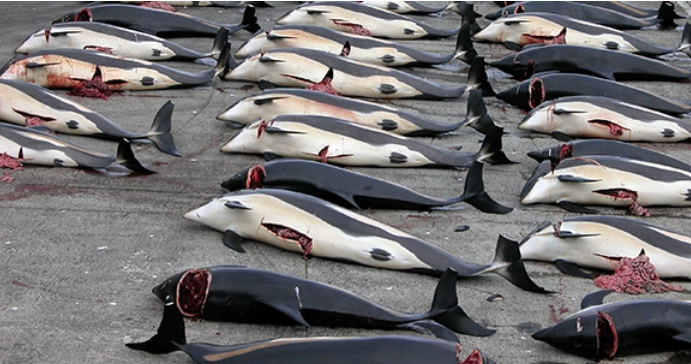
24. New Report Debunks Claims of Whale and Dolphin Hunters in Faroe Islands
In the wake of the latest Faroe Islands drive hunt on Friday that killed 42 more pilot whales, the Animal Welfare Institute and six other leading animal welfare and marine conservation organizations released a new report presenting evidence to challenge claims that the annual drive hunts are humane, sustainable, and integral to local culture. This latest hunt brings the total number of whales and dolphins killed in the islands to more than 900 this year — far higher than the typical annual average of 685 whales.
The report uses evidence-based arguments to take a critical look at the main justifications for the ongoing hunting of long-finned pilot whales and other small cetaceans in the Faroe Islands (a small self-governing Danish territory located between Scotland and Iceland). The centuries-old hunt, known as the grindadráp, is largely condemned by the international community.
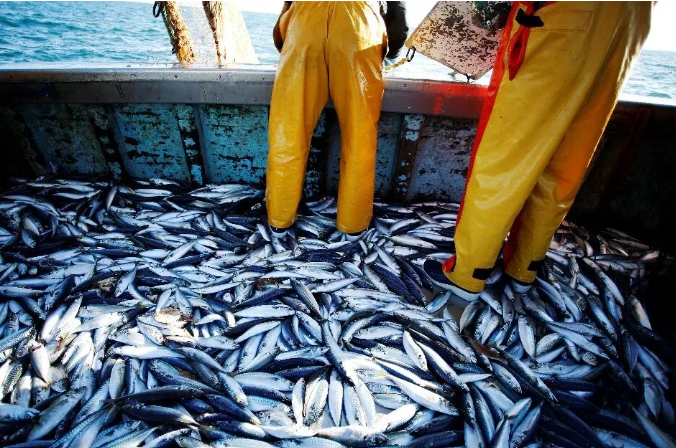
25. EU Bans Fish Imports from Trinidad and Tobago for Fishing Violations
Illegal, unreported, or unregulated (IUU) fishing is one of the most serious threats to the sustainable exploitation of living aquatic resources. Fighting IUU fishing is part of the EU’s actions under the 2030 Agenda for Sustainable Development of the United Nations. Because the EU is the world’s largest import market for fisheries products, the European Commission (EC) is responsible for ensuring that products stemming from IUU fishing activities do not access the EU single market.
The EC identified Trinidad and Tobago as a non-cooperating third country in the fight against IUU fishing based on its history of serious shortcomings in managing fishing vessels, allowing fish inspections, and adhering to conservation measures identified since 2016. Until Trinidad and Tobago address the identified shortcomings, importation of its fishery products will be refused.
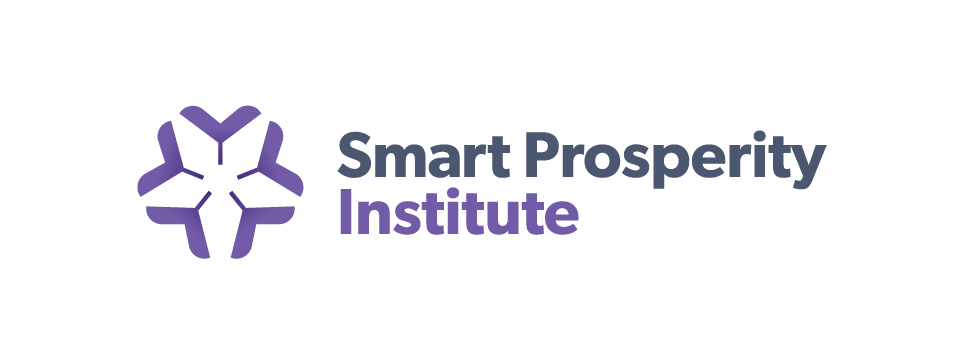
26. The Case for More Inuit-Led, Sustainable Economic Development in Canada
Nunavut is home to Canada’s fastest-growing economy, largely due to natural resource extraction. Two new reports show that there is an alternative economic model taking shape in Nunavut that can balance growth with social and environmental needs. The reports say that the region’s budding “blue conservation economy” — an economic model in which coastal regions generate wealth by using marine resources in a sustainable way — is creating stable income for those Inuit communities that are successfully leveraging it.
More than $1.35 billion in federal funding has been committed to advancing Indigenous-led conservation initiatives across the country since 2018. The reports identify key areas of investment that other coastal Inuit communities can use to chart their paths to a better future, such as strengthening local food harvesting and production or promoting local artisans. They also reinforce the business case to link conservation and local economic development.
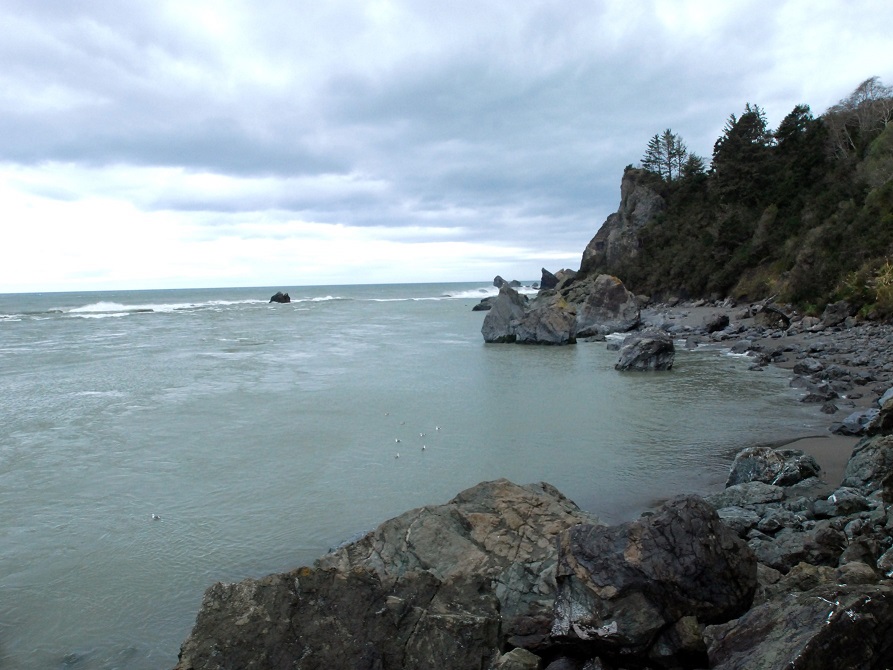
27. Tribes Designate a Marine Stewardship Area in Northern California
Last week, three tribal nations declared the designation of a marine stewardship area in Northern California. The protected area covers nearly 700 square miles of the tribes’ ancestral ocean and coastal lands, stretching from the California-Oregon border to just south of the seaside city of Trinidad in Humboldt County. This plan is part of a larger effort to recognize the use of tribes’ traditional knowledge, combined with new scientific practices when protecting marine environments.
This Indigenous Marine Stewardship Area (IMSA) is the first of its kind in the United States. The three tribes involved took inspiration from similar work led by Indigenous nations in Australia and Canada who have recently established marine protection areas. California officials have previously identified IMSAs as one way for the state to reach its goal to conserve 30% of state lands and waters by 2030.
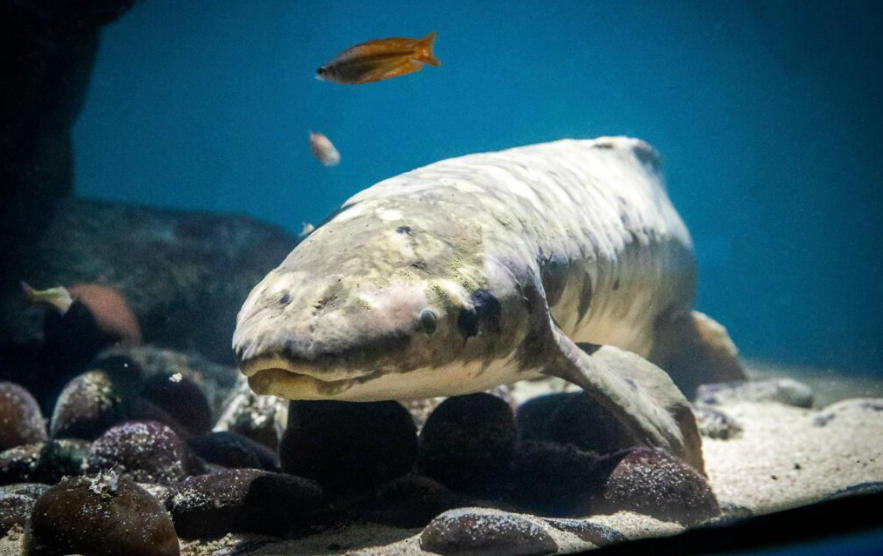
28. Lungfish, Methuselah, Even Older Than Thought
The world’s oldest-known living aquarium fish, the aptly named Methuselah, is even older than previously thought, her age just having been recalculated from 84 to 92. That puts the female Australian lungfish as starting life in 1931 when Jacques Cousteau was just coming of age. Kept at San Francisco’s Steinart Aquarium since the late 1930s, Methuselah’s age has just recently been more accurately calculated by “cutting-edge” DNA analysis.
She is important in helping to further our understanding of marine biodiversity, and how certain species can survive and even thrive. The fascinating lungfish can breathe using a single lung and live in slow-moving parts of rivers. For the first time since its discovery in 1870, new DNA testing offers the ability to predict the maximum age of the species. Ultimately, this valuable information can help keep the population thriving.

29. Charting the Blue Horizon: Understanding Nigeria’s Blue Economy -by John Oladipo
As Nigeria navigates the dynamic currents of the blue economy, a delicate equilibrium between economic progress and environmental conservation becomes paramount. With an unwavering commitment to global objectives and effective governance, Nigeria strives to not only unlock the potential of its blue economy but also serve as a dedicated custodian of our invaluable marine resources.
Nigeria’s blue economy voyage embarks amidst a diverse regulatory landscape, emphasizing the urgent need for resolute governmental intervention. The intricate interplay between international laws and treaties and national legislations accentuates the monumental duty to not merely navigate this intricate tapestry, but also steer the nation toward a horizon of flourishing blue prosperity. This journey necessitates prudent resource allocation towards sustainable blue initiatives, steadfast research, and cutting-edge technology development.
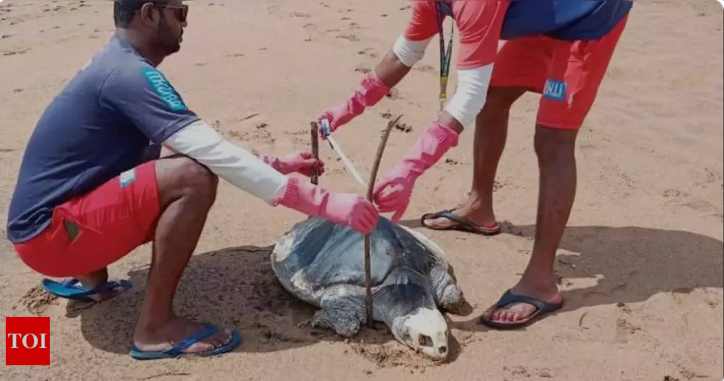
30. Goa Is Only State With Public-Pvt Team to Tackle Marine Stranding
Panaji, India: With a long coastline of over a hundred kilometers, Goa’s coast often sees different marine animals stranded on its beaches, from dolphins to sea turtles. Not responding fast enough could mean the loss of a life or an unattended carcass harming the ecosystem. To tackle this, the state forest department has now expanded its presence on its newly carved marine forest ranges by collaborating with various private bodies.
Goa is now the only state in India which has a structured public-private-community collaborative system to report and respond to the beach stranding of marine animals. The state monitors its beaches throughout the year, and around 100-150 cases are handled every year, said Puja Mitra, founder and director, of Terra Conscious, which was the first collaborator along with Drishti Marine, IUCN India, and the forest department in 2017.




